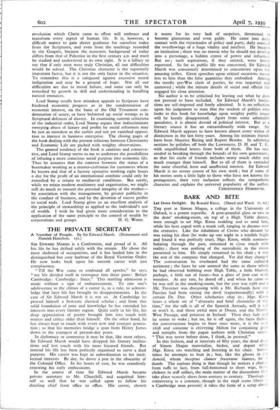THE PRIVATE SECRETARY
A Number of People. By Sir Edward Marsh. (Heinemann and Hamish Hamilton. 15s.)
SIR EDWARD MARSH is a Conformist, and proud of it. All his life he has drifted safely with the stream. He chose the most sheltered of occupations, and it has landed him in the distinguished but cosy harbour of the Royal Victorian Order. He now looks back upon his smooth career with just complacency.
" Till the War came to confound all epochs," he says, " my life divided itself in retrospect into three parts : Before Cambridge : Cambridge : Since." This startling admission is made without a sign of embarrassment. To rate one's adolescence as the climax of a career is, as a rule, to acknow- ledge that later life has brought its disappointments. In the case of Sir Edward Marsh it is not so. At Cambridge he proved himself a first-rate classical scholar ; and from this solid foundation of taste and knowledge he has extended his interests into every literary region. Quite early in his life, his deep appreciation of poetry brought him into touch with writers and critics older than himself. On the other hand, he has always kept in touch with every new and younger genera- tion ; so that his memories bridge a span from Henry James down to the youngest of present-day poets.
In diplomacy or commerce it may be that, like most others, Sir Edward Marsh would have dropped his literary inclina- tions and lost touch with his more leisured friends. But instead his life has been perfectly organised to serve a dual purpose. His career was kept in subordination to his intel- lectual interests By day, he drove a pen in the obscurity of the Colonial Office. In his hours of ease, he was ceaselessly renewing his early enthusiasms.
In the course of time Sir Edward Marsh became private secretary to Mr. Churchill, and acquitted him- self so well that he was called upon to follow his dazzling chief from office to office. His career, chosen
it seems for its very lack of surprises, threatened to become glamorous and even giddy. He came into daily contact with the vicissitudes of policy and party, daily enjoyed the overflowings of a huge vitality and intellect. He became an institution ; there was no reason why he should not develop into a personage, a hidden centre of power and influence. But no ; such aspirations, if they existed, were firmly repressed. So far as public life was concerned, Sir Edward Marsh was consciously determined to concentrate upon the amusing trifles. Great speeches upon critical occasions meant less to him than the false quantities they embodied. Among the terrific pre-War clash of parties, he was impartial and unmoved ; while the minute details of social and official life engaged his close attention.
No author is to be criticised for leaving out what he does not pretend to have included. Sir Edward Marsh's limita- tions are self-imposed and freely admitted. It is no reflection upon his judgement to state that the student of politics who looks to this book for knowledge upon weighty public issues will be keenly disappointed. Apart from some admirable anecdotes, it is almost devoid of political interest. But as a literary source it has an extraordinarily wide range. Sir Edward Marsh appears to have known almost every writer of distinction in the last forty years. Among his intimate friends have been Maurice Baring and Rupert Brooke. In adjoining sections he polishes off both the Lawrences, D. H. and T. E., with unpublished letters from both of them. He has suc- ceeded in breaking through the bounds of his own generation ; so that his circle of friends includes many much older and much younger than himself. But to all of them is extended the same cheerful, keen and unaffected interest. Sir Edward Marsh is no severe censor of his own work ; but if some of his stories seem a little light to those who have not known the protagonists, their very inclusion reflects the sympathetic character and explains the universal popularity of the author.
CHRISTOPHER HOBHOUSE.










































 Previous page
Previous page